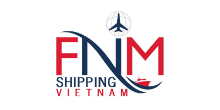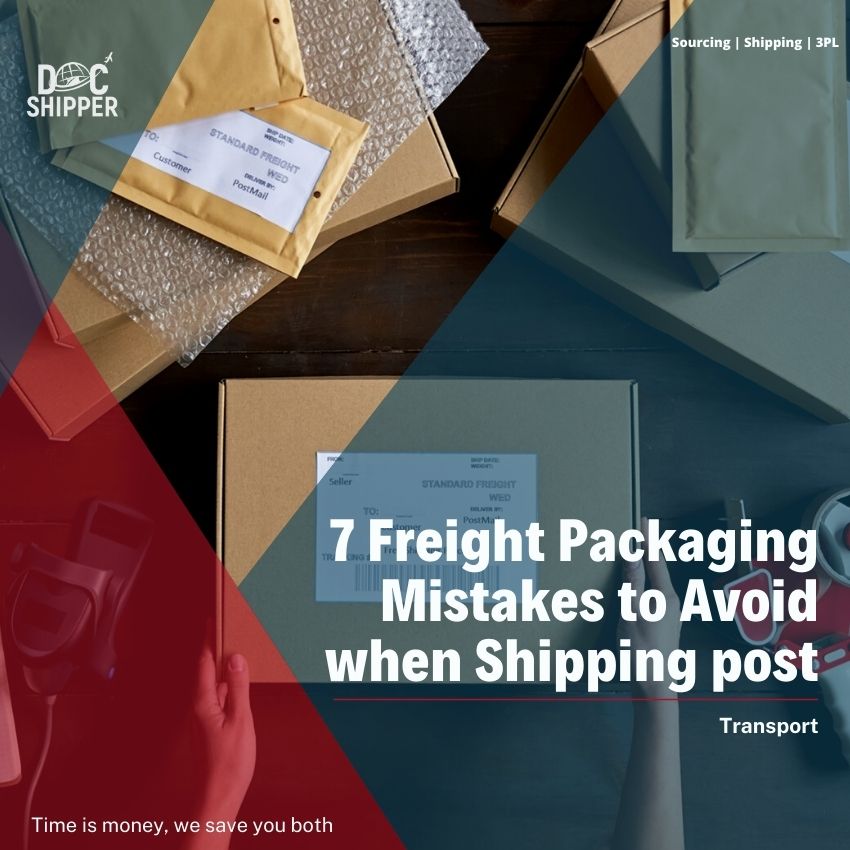Today, there are many ways to ship goods around the world: by air, sea and land. Thus, each mode of transport has its own characteristics and, depending on the one we choose, we will have to adapt the type of packaging to it to ensure safe transport. Mistakes can act as an obstacle to the smooth running of the process so we will expose you to the 7 main mistakes not to do in the packaging.
Summary
Not choosing the right packaging material
Choosing the wrong packaging material can result in significant damage to the goods in transit, as goods are variable and require attention to their various characteristics in order to best plan for the right packaging material to ensure the best possible shipping experience.
Commonly used materials for international shipping included
-Corrugated cardboard, is a strong and lightweight packaging material that is commonly used for shipping everyday consumer products.
-Bubble plastic, used to wrap fragile items such as dishes, electronics, etc. to protect them from shock and vibration.
-Foam pads, are used for fragile items and to protect electronics and glassware.
-Kraft paper, is a material used to wrap products before placing them in boxes such as clothes, shoes, toys, etc...
-Wooden crates,are used for shipping heavy items such as industrial machinery, construction equipment, etc.
Therefore, it is important to choose the appropriate packaging material according to the nature of the goods and the transportation conditions.
Ensure your goods arrive at their destination in perfect condition with DocShipper's international shipping service.
Customs blockages can be frustrating and costly for your business, so we offer effective, professional packaging solutions to ensure your products are optimally protected during transit and we work closely with our customers to ensure a smooth and efficient shipment.Contact us to get more informations.
Not providing adequate protection
Adequate protection is essential to avoid damage during transport. The unexpected can be many and we are never sure what can happen to the merchandise.
The product must be well-positioned, fixed, and protected to avoid any damage. Damaged goods will not necessarily hurt the customer and will therefore impact the image of your company.
Failure to comply with the requirements can therefore have serious consequences.
Not labelling correctly
When it comes to packaging mistakes to avoid during shipping, not labelling correctly can cause significant problems. In particular, transport labels must be meticulously crafted and accurately placed to ensure the safe delivery of goods.
It is essential that these labels are clearly visible and contain vital information, such as the delivery address, handling instructions, and hazard symbols, to avoid any potential delays or additional costs.
The omission of crucial information on transport labels may lead to confusion, loss of goods, or even safety hazards. Therefore, it is vital to double-check that the labels are legible, scannable, and placed correctly.
This includes verifying that they are affixed in a prominent position and in compliance with local and international regulations, to guarantee that the package arrives at its intended destination without any issues.
Ultimately, taking the time to ensure the accuracy of transport labels can help prevent potential complications and ensure successful delivery.
FNM Note: International logistics can be complex and costly if not handled properly, so we offer a complete international shipping service to ensure your products arrive at their destination in perfect condition and without hassle. We work closely with our customers to ensure efficient shipping and our experienced team ensures that each shipment is properly labeled and documented to avoid costly mistakes.
Not meeting weight and dimension requirements
International transport regulations have weight and dimension limits that must be respected. If the limits are not met, additional charges may be levied and the goods may be delayed or refused, so failure to comply with the requirements can have serious consequences. Here is some general information on weight and dimension limits for the main modes of transport:
-Road transport: weight and dimension limits for trucks vary according to local regulations and vehicle types. In general, the maximum allowable weight limit is approximately 40 tons, while the maximum dimensions are approximately 2.6 meters wide, 4 meters high and 16.5 meters long.
-Rail transport: Weight and dimension limits for freight cars also vary depending on local regulations and car types. In general, the maximum weight limit is approximately 120 tons, while the maximum dimensions are approximately 2.6 meters wide, 4 meters high and 19.8 meters long.
-Maritime transport: Weight and dimension limits for containers vary according to local regulations and container types. In general, the maximum weight limit for a 20-foot container is approximately 30 tons, while the maximum weight limit for a 40-foot container is approximately 32 tons. The maximum dimensions for a 20-foot container are approximately 2.44 meters wide, 2.59 meters high and 6.06 meters long, while the maximum dimensions for a 40-foot container are approximately 2.44 meters wide, 2.59 meters high and 12.19 meters long.
-Air Transportation: Weight and dimension limits for air packages vary depending on local regulations and airlines. In general, the maximum weight limit for a package is approximately 70 kg, while the maximum dimensions are approximately 1.5 meters long, 1.5 meters wide.
Not following regulatory requirements
International transportation is subject to strict import and export regulations, and it is important to follow the regulatory requirements to avoid late delivery, fines and confiscation of goods.
Here are some key elements of international transportation regulations :
International Conventions : There are several international conventions that govern international transport, including the Convention on International Carriage by Rail (COTIF), the Convention on the Carriage of Goods by Road (CMR), the Convention on International Carriage of Goods by Sea (CTIM), the Convention on International Civil Aviation (Chicago Convention), and others.
Transport documents : For international transport, it is mandatory to use certain documents, such as the air waybill (AWB), bill of lading (BOL), rail waybill (RBL), road transport contract (RTC), etc. These documents are used to prove possession of the goods, describe their nature and quantity, specify the conditions of carriage, etc.
Carrier responsibilities : International carriers have specific responsibilities, including safety of the goods carried, timeliness, compensation for loss or damage to the goods, etc. Customs formalities: International transport often involves customs formalities, which vary according to the country of origin and destination, the type of goods carried, etc. These formalities may include the declaration of the goods as a "customs declaration. These formalities may include customs declaration, payment of duties and taxes, obtaining specific licenses or authorizations, etc.
Technical standards and regulations : The goods being transported must comply with specific technical standards and regulations, including those relating to safety, health, the environment, etc. These standards and regulations may vary according to the type of goods being transported. These standards and rules may vary depending on the type of goods, the mode of transport, the countries of origin and destination, etc.
Non-compliance with them can also expose you to more or less heavy penal sanctions and the bad referencing of your company.
FNM Note: If you are concerned about your cargo and are looking for a reliable freight shipping service, DocShipper will certainly meet your expectations. We offer a highly professional packaging service to protect your goods during international transport, and we have a thorough knowledge of customs regulations to avoid any unnecessary blockages or delays.
Not having insurance
Whether in everyday life or in logistics, insurance will cover you and the eventual replacement of goods as well as damage to third parties, other goods, or the environment. Docshipper has cargo insurance that can cover a variety of risks, such as transport accidents, weather damage, theft, burglary and other transport-related risks. Customers can choose the level of coverage that best suits their needs, depending on the value of their cargo and the specific risks they wish to cover.
In the event of loss or damage to insured cargo, customers can file a claim with Docshipper, which will process the claim and compensate the customer based on the value of the cargo covered by the insurance.
It is therefore important to insure at least the riskiest shipments, and an insured shipment allows you to anticipate any problems and quickly offer customers an alternative. An insured shipment allows you to anticipate any problems and to quickly offer an alternative to your customers. Your customers will appreciate your service and will have more confidence in you, and will be more likely to buy your products again.
Let DocShipper handle the international logistics to ensure your goods reach their destination safely. We have extensive knowledge of customs regulations around the world and ensure that every shipment is properly documented to avoid blockages or delays.
Messing up the shipping terms
The faster a customer receives their order, the more likely they are to trust you. This can increase the chances of re-ordering your products. On the contrary, a customer who receives his order late, is likely not to repeat the same buying experience. Consider preparing the order as soon as possible and choose carriers that offer a shorter delivery time.
FAQ | 7 Freight Packaging Mistakes to Avoid when Shipping
Why is international packaging important commercially?
International packaging is important for 2 main reasons:
Product Protection: International packaging is designed to protect the product during shipping and handling, which can be difficult and sometimes unpredictable due to long distances, weather conditions, and the different modes of transportation used. Improper packaging can cause damage to the product, which can result in financial losses for the company.
Compliance with standards and regulations: International packaging standards and regulations vary from country to country and may have specific safety, hygiene, health and environmental requirements. Companies exporting products must ensure that their packaging complies with these standards and regulations to avoid penalties, delays or denial of entry of their products into the destination country.
What are the main functions of international packaging?
As you have seen before, the packaging is essential in the international market as compliance with standards and regulations and Product protection. Nevertheless, to be effective, packaging must fulfill several functions, two of which are particularly important:
-Protect and preserve: Indeed, the packaging of a product must be able to protect and preserve it from bad weather, shocks or temperature variations.
-To distribute : The distribution includes the problems of handling, shipping and presentation at the point of sale. It is a question here of creating a packaging that will facilitate the transport and handling of your products, even once they are grouped together.
How to fully ensure the security of the goods during international transport?
Ensuring the safety of the goods during international transport is essential to avoid financial losses and health risks to consumers. Here are some steps to take to ensure the safety of products during international transport: Use appropriate packaging: the packaging must be appropriate for the product and its mode of transportation. It must be strong enough to withstand shocks, vibrations and temperature variations. Comply with regulations: It is important to comply with health and safety regulations in the countries of departure and destination. Rules may vary from country to country, so it is important to find out the specific requirements of each market.
DocShipper info: Did you like this article? You may also like the following:
Adivce FNM :We help you with the entire sourcing process so don't hesitate to contact us if you have any questions !
- Having trouble finding the appropriate product? Enjoy our sourcing services, we directly find the right suppliers for you!
- You don't trust your supplier? Ask our experts to do quality control to guarantee the condition of your goods!
- Do you need help with the logistics? Our international freight department supports you with door to door services!
- You don't want to handle distribution? Our 3PL department will handle the storage, order fulfillment, and last-mile delivery!
DocShipper | Your dedicated freight forwarder in Vietnam !
Due to our attractive pricing, many customers trust our services and we thanks them. Stop overpaying the services and save money with our tailored package matching will all type of shipment, from small volume to full container, let us find the best and cost-effective solution.
Communication is important, which is why we strive to discuss in the most suitable way for you!











